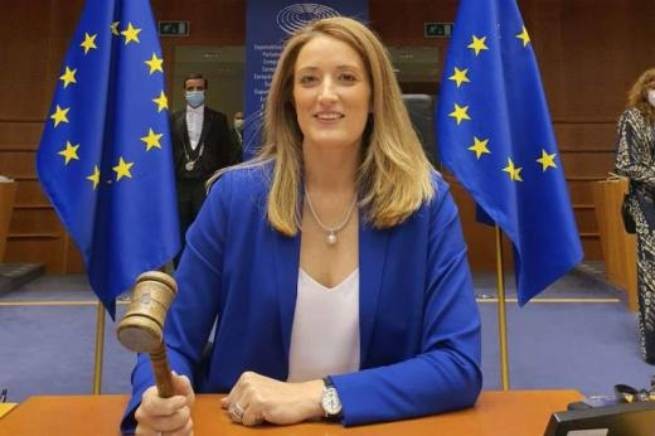Former Facebook employee and whistleblower Frances Haugen on Wednesday pleaded with lawmakers to avoid the usual deadlocks in Congress as they weigh proposals to curb social media abuse by limiting companies’ legal protections of free speech.
However, Haugen called for caution when amending the 1996 law that provides legal protections for both content posted by platforms and companies that remove posts they deem offensive. She cited the unintended consequences of the previous edition of Congress: “I urge you to move forward with open eyes on the consequences of reform,” Haugen testified at a House Energy and Commerce Subcommittee hearing. “I urge you to speak with human rights activists who can help explain how the latest reform … has had a dramatic impact on the safety of some of the most vulnerable people in our society.”
Lawmakers have put forward the proposals after Haugen unveiled a case in October in which Facebook systems fuel online hate and extremism and fail to protect young users from malicious content.
Her previous revelations have spurred legislative and regulatory efforts around the world to tackle Bigtech, and she has recently appeared on several occasions before European lawmakers and officials who are drafting rules for social media companies.
Haugen, a data scientist who worked as a product manager in Facebook’s civil ethics department, backed up her claims with a huge amount of internal company documents, which she secretly copied and made available to federal securities regulators and Congress.
“Facebook wants you to get caught up in a long, drawn-out debate over the smallest details of different legislative approaches. Please don’t fall into this trap, ”she told lawmakers on Wednesday. “Time is of the essence. There is a lot at stake here. You have a unique opportunity to create new rules for our online world.”
When she first appeared in public this fall, laying out a far-reaching denunciation of the social media giant in front of the Senate’s subcommittee on commerce, Haugen gave Congress a recipe for action. She has rejected the idea of dividing the tech giant, which has been called for by many lawmakers, favoring targeted legislative remedies. In particular, they include new restrictions on long-standing legal protections for speech posted on social media. Both Republican and Democratic lawmakers have called for the removal of some of the protections provided by a 25-year-old provision of law known as Section 230, which protects Internet companies from liability for what users post. The law, passed at a time when many of the most influential social media platforms did not yet exist, allowed companies like Facebook, Twitter and Google to grow to the giants they are today.
“Let’s work together on bipartisan legislation because we can’t wait any longer,” said Rep. Mike Doyle, chairman of the Communications and Technology Subcommittee.
Facebook and other social networks use computer algorithms to rank and recommend content. They control what is displayed on users’ news feeds. Haugen’s idea is to remove protection in cases where dominant content, governed by algorithms, restricts massive user participation in the interest of public safety.
That’s the idea behind the Malicious Algorithms Justice Act, which was introduced by senior House Democrats about a week after Haugen testified before the Senate College in October. The bill would make social media companies accountable by removing their protections under section 230 for specific guidelines for users believed to be causing harm. The platform loses its immunity in cases where it “knowingly or inadvertently” promotes malicious content.
Haugen, who previously focused most of her public appearances on her view of Facebook’s flaws, sharply criticized Wednesday’s hearing on TikTok, a video platform hugely popular with teens and young children.
“TikTok is designed to be censored,” she said, arguing that its affiliation with China’s ByteDance makes it eligible for mandatory content. Haugen argued that TikTok’s algorithms are more addictive even than Facebook’s messaging service Instagram, which she criticized at length, citing internal research showing obvious harm to some young users, especially girls. The study found that peer pressure from Instagram led to mental health and body image problems, and in some cases, eating disorders and suicidal ideation. TikTok representatives did not respond to a post requesting comment.
Rep. Frank Pallone, DNJ, who chairs the full energy and trade committee, said the proposal by his senior Republican Rep. Katie McMorris Rogers of Washington is not identical to the Democratic bill, but represents a good start for a potential compromise. All legislative proposals are awaiting final approval by Congress. Some experts who support stricter regulation of social media say Democratic law, as it was written, could have unintended consequences. They suggest that it is not clear enough about which particular algorithmic behavior will lead to a loss of liability protection, making it difficult to understand how it will work in practice and leading to widespread disagreement about what it might actually do.
Meta Platforms, the new name of Facebook’s parent company, declined to comment on specific legislative proposals. The company is in favor of updating the rules.
“We are a platform for free expression, and every day we have to make tough decisions about the balance between giving people a voice and limiting harmful content,” Meta said in a statement Wednesday. “Unsurprisingly, Republicans and Democrats often disagree with our decisions, but they also disagree with each other. What we need is a set of updated rules for the Internet set by Congress that companies must follow, so we’ve been asking for this for almost three years. “
Meta CEO Mark Zuckerberg has proposed changes that will only provide legal protections for Internet platforms if they can prove that their systems for detecting illegal content are working properly. However, smaller tech companies and startups may find it harder to meet this requirement, leading critics to accuse it of ultimately favoring Facebook. Other social media companies have called for caution in making any legislative changes to section 230.
https://www.barchart.com/story/news/6427651/as-lawmakers-mull-curbs-on-social-media-haugen-weighing-in – original in English
In fact, although Haugen was initially positioned as a fighter for a “clean Internet”, it helps to ensure that Facebook, already dependent on the American government, will be even more subject to government regulation. American government regulation, where the order of discussion on the site is increasingly determined not by some rules of the site itself, but by a compromise decision of two American parties. That is, Democrats and Republicans will determine for you exactly how you should communicate on Facebook – what can be blocked, and what can be left for now. This is essentially a reconfiguration of state censorship in social networks, which should adopt such security rules that suit the political leadership. Along the way, on the sly, the Chinese are also being hammered with their Tik-Tok, which, even under Trump, was put in a depressed position, demanding to sell the American branch under threat of closure.
Of course, all this is part of the global processes of network fragmentation, where states are increasingly engaged in fencing off national segments and attacking global services that are trying to play “independence and objectivity”. But the end of the process seems to be very predictable – full or partial submission to state regulation seems inevitable, even if marketing statements about “business freedom” and “we are a private company” are preserved. This happens with Facebook and the same Telegram. One way or another, they are forced to “cooperate with the administration” by direct and indirect methods.
In the case of Facebook or Twitter, the possible lifting of immunity will lead to the fact that avoiding legal responsibility for the distribution of “harmful content”, the company has nothing to do but tighten censorship. And the content of “malicious content” is determined by internal structures affiliated with NATO, the Atlantic Council and other similar wonderful organizations that delegate internal censors who make lists of unwanted words, terms and information that must be blocked a priori. Of course, without trial or investigation. Simply, the private opinion of individuals formally becomes a guide to action for hundreds of millions of users. Of course, the position of the state or the military-political bloc is behind the opinion of private individuals. The company itself acts as a censorship tool on the Internet under the guise of “well, we are a private company – if you don’t like it, leave.” And since control is gradually being established over an increasing number of services and platforms, then for the “digital marginalized” there are only compressed “altmedia” or artisanal social networks, like the one Trump is trying to promote. This is what the “wonderful world of the free internet of the future” looks like. Of course, the rules of the information world of the future will be determined not by “free users”, but by states and special services, as well as corporations that serve them.
PS Censorship by grant-eating organizations looks like this https://www.stopfake.org/ru/fejk-sredi-vaktsinirovannyh-ot-covid-19-massovye-sluchai-raka/
The result is a monthly ban and a limitation in issuance. There can be only one truth, and it is written in the USA. All other points of view that do not cope with the above are deliberately fakes.






More Stories
Greece must transfer the Patriot PAC-3 system to Ukraine with US “guarantees” against the Turkish threat
How will the confiscation of Russian assets affect the global financial system?
TikTok ban in the USA: Americans force the owner company to sell its assets